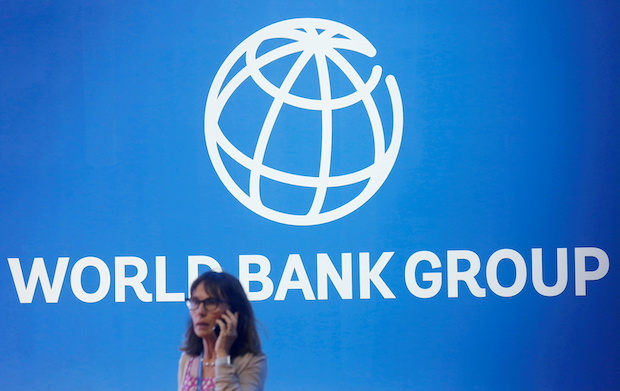World Bank: New reforms needed to heal pandemic scars

A participant stands near a logo of World Bank at the International Monetary Fund – World Bank Annual Meeting 2018 in Nusa Dua, Bali, Indonesia, Oct. 12, 2018. (File photo from REUTERS)
MANILA, Philippines —New reforms are needed to mitigate—and even reverse—a projected slowdown in the growth of economies in East Asia and the Pacific (EAP), including the Philippines, due to the ugly scars left by the pandemic’s onslaught, the World Bank (WB) said.
In a new report called “Falling Long-term Growth Prospects,” World Bank said EAP’s potential output growth was forecast to hit an average of 4.6 percent annually in the remainder of the current decade.
If realized, that would mark a deceleration from the 6.2-percent growth a year seen from 2011 to 2021 which, as it is, was already slower than the 7.6-percent average expansion seen after the 1997 to 1998 Asian financial crisis.
Compared to past crises, the World Bank explained that recovery from the COVID-19 pandemic had been “uneven” in EAP after the global economy dealt with subsequent problems like the Russia-Ukraine war and deadlier natural disasters due to climate change.
READ: Global economy will slow for third straight year in 2024 —World Bank
Following a significant contraction in 2020, investment in the region rebounded in 2021 but remained about 4 percentage points below its prepandemic trend, the World Bank said, adding that this gap is not expected to close over the remainder of the decade.
Disruptions
“The pandemic disruptions of 2020-22 are expected to have lasting negative effects on economic growth across EAP through their adverse impact on human capital and fixed- capital formation,” the Washington-based multilateral lender said.
“Pandemic-related school closures, lost working hours and job skills, and especially large declines in earnings of those working in the informal sector—a significant proportion of the workforce in some economies in the region—also negatively affected actual and potential output in the region,” it added.
In 2020, the Philippine economy crashed 9.6 percent, the worst meltdown on record after pandemic lockdowns paralyzed economic activities.
READ: PH posts worst recession in 2020
The World Bank said the virus-induced disruptions on schooling were expected to have a “lasting effect” on the Philippines’ labor market.
Indeed, while the government reported that the 2023 gross domestic product (GDP) was 8.6 percent higher than prepandemic levels and unemployment dipped to historic-low in November last year, most of the jobs being created were of low quality.
Moving forward, the World Bank said higher investment in infrastructure designed to improve disaster resilience and meet climate goals could provide an additional boost to potential growth, along with other “growth-enhancing” reforms.
Financing needs
But financing such investment will depend on country circumstances. For the Philippines, the World Bank said the country may need to broaden the tax base to fund these crucial projects.
To tackle the learning losses during the pandemic, the Bank suggested implementing measures to adjust school curricula and develop rapid catch-up periods. In the longer term, the agency said EAP countries should seek to develop more resilient and inclusive education systems that can deliver learning in the event of future crises, including through remote learning.
“In a scenario in which each country in EAP is assumed to repeat its largest 10-year improvements in investment growth … it is estimated that potential growth could be raised by 0.8 percentage point a year by the end of this decade,” the World Bank said. INQ
